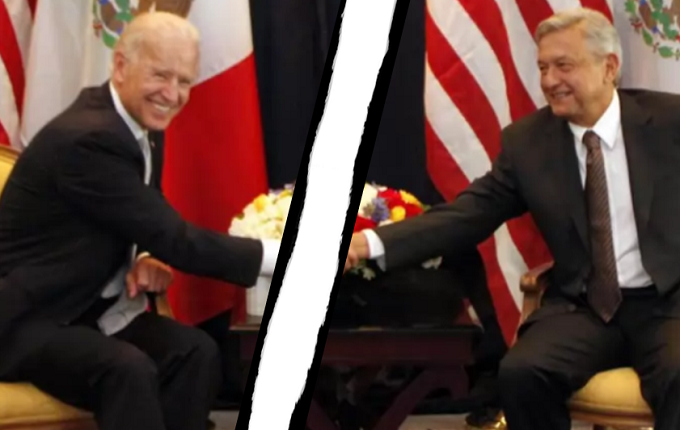This limbo is causing the anguish of Mexico’s private sector. The President of the CCE, Carlos Salazar, went to the National Palace to address the clouds that the Biden era will bring to Mexico.
MEXICO CITY (El Universal/Roberto Rock) – Andrés Manuel Lopez Obrador has determined to postpone the decision to congratulate Joe Biden as the next President of the United States until December 14, when the electoral councils will cover the formality of declaring the winner. He also ordered the cabinet to halt all contact between his administration and the incoming team in Washington.
The deadline, which will coincide with the one set by Donald Trump to assume his defeat, is putting a severe strain on virtually all areas of the presidential team. From the foreign ministry to the environment, to the economy, to the governor’s office and the federal prosecutor’s office – which is in charge of a vast binational agenda.
This fact was noted days ago in the U.S. capital, when an initial dialogue between participants of the López Obrador government and Julissa Reynoso, a woman of modest origins in the Dominican Republic, was abruptly broken off. Reynoso migrated to New York, graduating from Harvard Law School and building a stable diplomatic career that had placed her until weeks ago at Uruguay’s embassy’s head. She was called to lead Jill Biden’s team, the next first lady in the United States.
According to experts from both countries consulted by El Universal, this atmosphere of disconnection has sown the same climate that accompanied Bill Clinton’s arrival at the White House in January 1993. The Salinas de Gortari administration (1988-1994) had backed the failed reelection candidacy of George Bush Sr. Salinas knew that Clinton was opposed to NAFTA, which had already been approved, but that it would not come into effect until January 1994, amid the decline of the Mexican six-year term. It was necessary to apply last-minute patches to the treaty, with labor and environmental sections, among others.
Just this type of issue seems to have convinced López Obrador not to applaud Biden, even though tradition dictates that they will have four long years to achieve. They may be the only ones who, by age, will last under Biden’s leadership, so he will accelerate decisions.
This limbo is causing our private sector anguish. On Monday 23rd, the President of the Business Coordinating Council, Carlos Salazar, went to the National Palace with other leaders. The meeting with AMLO was reported to be the law against subcontracting. Still, the primary axis was the clouds that the Biden era will bring, with labor inspections and the continuity of the Trump policy of pressures on U.S. corporations that generate jobs outside the neighboring nation.
Salazar Lomelin plans to be reelected next year after taking over several chambers and groups in the sector (among them, Coparmex). However, he has had to work on a slippery slope since the beginning of his administration in February 2019, almost at the same time as the current government’s beginning.
One of the essential reasons for his arrival at the CCE was that he represents Monterrey’s prominent business captains. The other strong argument was his fellow countryman, Alfonso Romo, as head of the Office of the Presidency.
But the mythical group of “The 10” great businessmen with a seat in Monterrey’s capital today looks disintegrated by a complicated scenario in which the economic, fiscal, political, and even judicial problems of some of them coexist. And Romo seems lost in the face of what appears to be a vacuum of confidence in Palacio. The mixture seems poisonous.
Roberto Rock – El Universal
—
Roberto Rock is a graduate of the Faculty of Political and Social Sciences of the UNAM. He holds a diploma from Northwestern University in Journalism Business Administration. In 1990 he was awarded a scholarship by the “Ford” and “Miguel Alemán” foundations in Washington, D.C., where he participated in various journalistic projects in the offices of “The Baltimore Sun” in the U.S. capital. He worked in the newspaper “El Universal” between 1979 and 2013. As a reporter, he covered the United States, Central America, Europe, the Middle East and Asia. He founded and directed multiple regional newspapers in several Mexican states. He is co-author of the books “Los Intocables” (Planeta, 2009), “Violencia y Medios” (Insyde, 2005), “Representación Política y toma de decisiones” (FIDAC, 2004), “Comunicación y Transparencia de los poderes del Estado” (FIDAC, 2003), and “Zócalo Rojo” (Editorial Océano, 1982).


